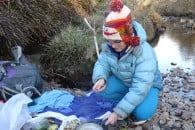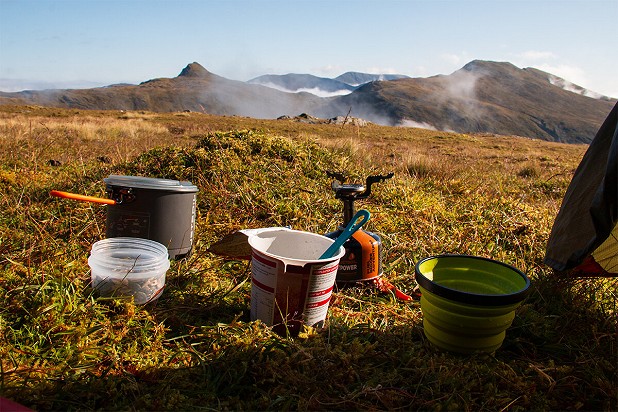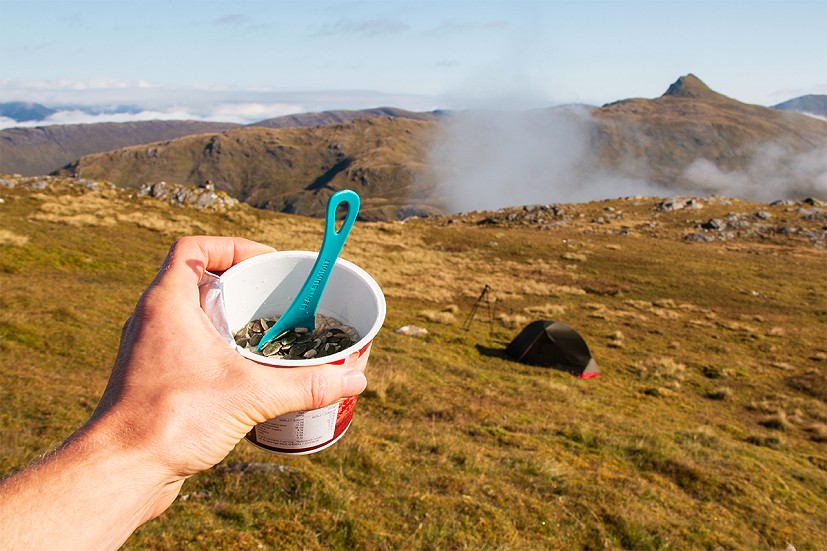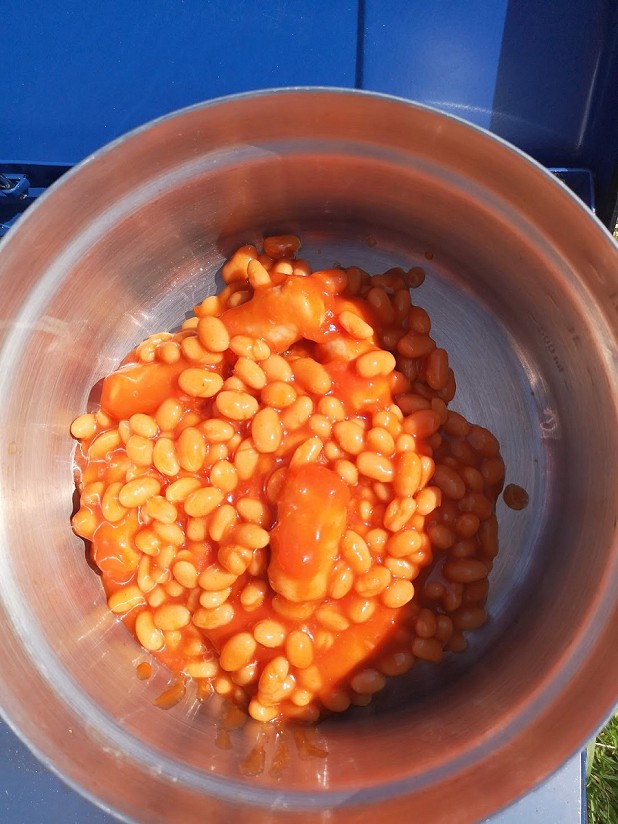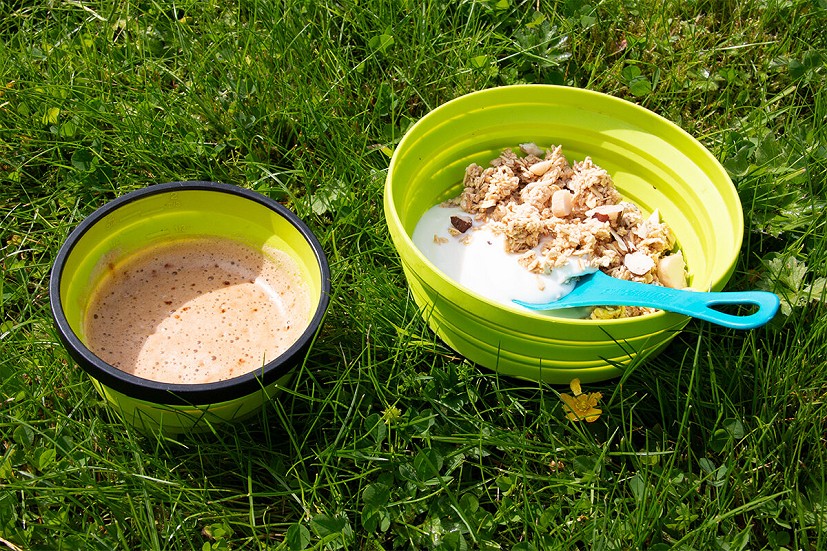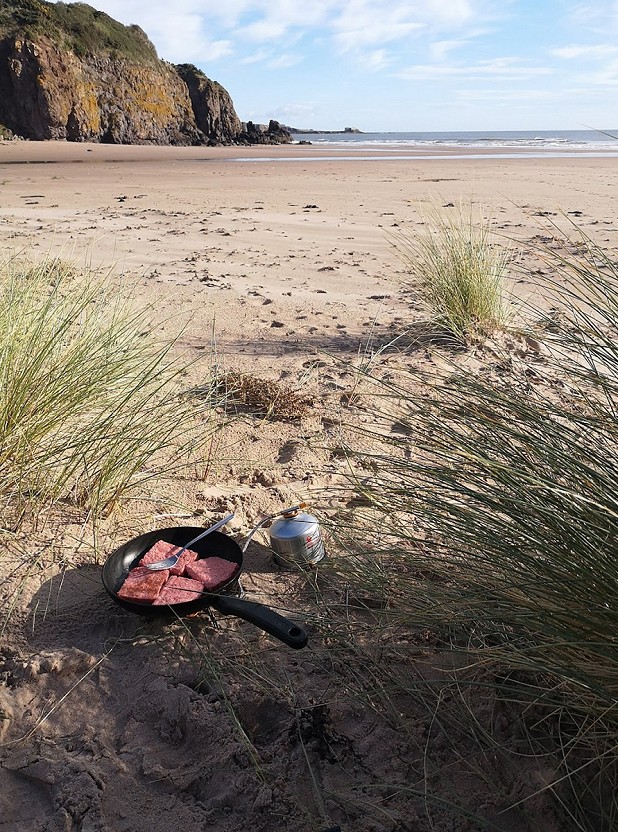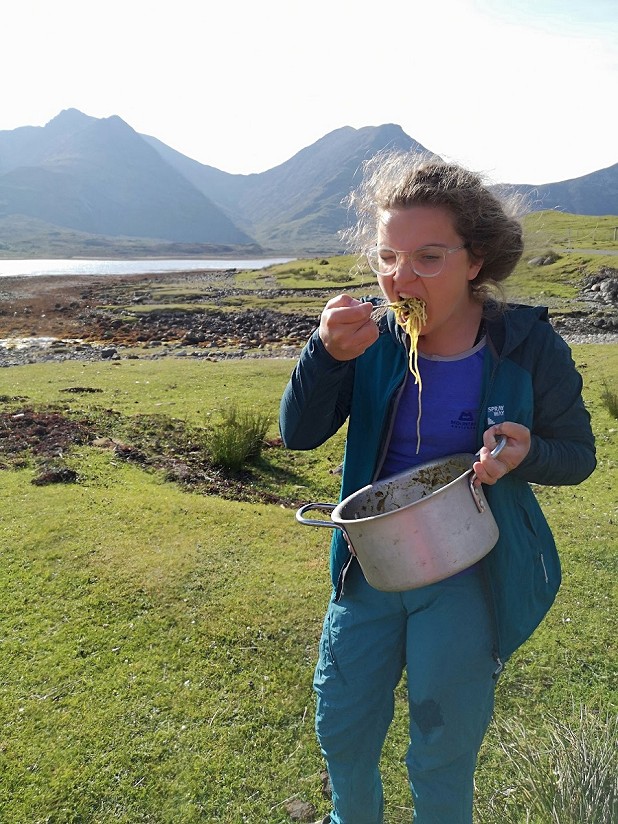What to Have For Breakfast in the Hills
If you're about to embark on a big Munro or mountain multi-pitch day, then starting well-fuelled is a must. But what food actually makes the best backpacking breakfast? From cold oats to salty meat, Fliss Freeborn rates some of the leading contenders.
As a general rule, I have no interest in breakfast unless it involves at least two courses and a cocktail. At home, where the extent of my physical activity is walking to the fridge and back to my desk, I prefer to subsist on just tea and an overinflated sense of justice until it's lunchtime and the real feasting (half a jar of olives and several fistfuls of ham) can begin.
In fact, there is only one situation on this planet in which I consider breakfast to be essential - and that's whenever I wake up in a sleeping bag somewhere remote with six to eight hours of fairly intense aerobic activity ahead of me. Experience has taught me that if nothing goes in when I wake up, I will wilt within the first 40 minutes of hoiking the pack on my back and become even more of a nuisance to my teammates than usual.
And while I'd ideally break my fast with smoked salmon and buttery scrambled eggs, washed down by a peach bellini before I've put my trail shoes on, this is hardly the most weight-efficient option for backpacking. A bottle of prosecco weighs about 1.2kg, after all, and drinking before midday anywhere other than an airport is considered eccentric - if not downright problematic.
Contrary to popular belief, oats alone don't keep you all that full for all that long
So then, the age-old question of what to have for breakfast rears its annoying little head again. Whatever you choose has got to be easily stowed in a pack, minimal effort to prepare in a tent, and offer a decent calore return for its weight.
To decide on the best options once and for all, I have conducted a very thorough and entirely scientific investigation of the best hill breakfast options. I've rated common choices on nutrition (including comments on macronutrients in addition to plain old calories), portability (does it travel well? Is it lightweight and not too bulky to carry?), cooking & cleanup (which I've classed as 'faff-less factor') and of course, deliciousness. And because this is about physical performance and exercise rather than creating Michelin-star-worthy scran, I think nutrition should be weighted more highly than any other factor, so I've ranked this one out of 20, rather than 10 for the others.
1. Porridge
Forget marmite: porridge is the real OG of love/hate relationships with food. Personally, I love creamy porridge oats, but only as a vehicle for dark brown sugar, fresh raspberries and a dollop of Cornish clotted cream, which makes it a) more of a dessert than breakfast, and b) annoying to take up a hill. Porridge when camping - made with water, and topped with whatever you can be bothered to bring - is tolerable at most. If I'm doing something really strenuous, I'll force down a small bowl but it won't be enjoyable and I'll be sick of it by the last spoonful.
Perhaps my disdain is justified because, contrary to popular belief, oats alone aren't quite the nutritional powerhouse people like to think they are. While they do contain both beta glucans and an amount of other insoluble fibre, I've found they really don't keep you all that full for all that long. If you're eating plain porridge oats, or those wee silly porridge pots with just honey or dried fruit, this can spike blood sugar and leave you relatively hungry just a few hours later, so for proper fuelling, bring along some protein powder, peanut butter, nuts and seeds to accompany it.
Before we had advertising to tell us to consume as many sweetened grains as possible first thing in the morning, humans would eat whatever they liked for breakfast - including leftovers from the night before
- Faffless factor: 7/10 (quick and easy to prepare, but sometimes a bugger to clean up in the pan, hence losing three points)
- Portability: 9/10 (dried oats mixed with seeds and protein powder takes up hardly any room - you just need to take or find water to cook it with. Porridge also seems to be the go-to option for longer trips, seeing as it takes up such little space for the calories provided.)
- Nutrition score: 13/20 if just plain or with something sweet, rising to 18/20 if done really properly with fat, fibre and protein. We'll go with 16/20 for balance
- Deliciousness: either 10/10 or 0/10, depending on who you are, so let's go with 5/10
2. Overnight oats
The sloppier, wetter cousin of porridge. If there's one thing I cannot fathom, it is why you would want to eat this for breakfast, let alone any other time of the day. And don't come at me with any of this bircher nonsense either - that's the same thing but it remained neutral during the war. If there's one prep-ahead slimy breakfast that I can get on board with, then that is chia pudding, because at least it owns the fact it looks and feels like frogspawn. And I respect that.
- Faffless factor: 10/10 (The faffless-est of faffless breakfasts: pour your milk or yogurt on the night before, add in your toppings and you're set. Shame it's just not very nice.)
- Portability: 8/10 (does nicely in a non-leaky tupperware but is slightly heavier than carrying the dried stuff and making actual porridge with milk powder or water)
- Nutrition score: 18/20 (you're more likely to add nuts, seeds, fruit and otherwise more nutritionally interesting things to it, because eating cold, wet oats on their own is pretty miserable)
- Deliciousness: 2/10 but I'm going to be nice and give it 5/10 in the interest of eliminating bias against slop.
3. Sausage and beans in a can
I've always been intrigued but never quite brave enough to bring one of these home with me from Aldi, so I jumped at the chance to try this for breakfast for this article. It tasted surprisingly ok but at 428 calories for the whole tin, it'd be considered a fairly light option if you were walking the whole day (as it happened, I ate it and then ran an extremely strenuous and exhausting 6km). Naturally, the tin weighs a fair bit, but for your 400g you get a relatively good balance of 48g of carbs, 23g of protein and 13.6 of fibre, which is pretty good for keeping you full - you just wouldn't want to carry more than one especially far.
Prep-wise, the whole thing can be heated directly on a stove if you're willing, but I opted to tip it into a pan for speed, and it took 4 minutes to be piping hot. But the real advantage here is the whole thing costs just under 60p, which gram per pence probably makes it one of the cheapest ways of getting that amount of protein and fibre in you. Granted, it comes with 2.5 teaspoons of sugar thrown in for good measure, but actually when you're burning through glycogen like a fire through a gorse hedge, then that's probably ok.
- Faffless factor: 6/10 (you'll probably need a pan to heat it up if you're not going to be a troglodyte and eat it cold)
- Portability: 7/10 (it's not going to leak, or smell or be annoying - but it will weigh as much as a kitten, or a large male african bullfrog)
- Nutrition score: 15/20 (not as many calories for your weight, but is low in sat-fat, and has lots of fibre to balance out the sugar)
- Deliciousness: 7/10 (it's baked beans with cheap hotdogs mixed in, so I'm all over it)
4. Greek Yogurt Pouch with nutty muesli or granola
On the hill, this is what I'll mostly go for. You can get squeezy pouches of UHT yogurt which I will have mixed in with a portion of muesli, granola or bran flakes and nuts taken in separately in a ziplock bag to retain crunch. You get calories, fat, protein and fibre and the whole thing is fairly faffless - I mix mine up in a camping mug and just rinse it out later on.
Faffless factor: 8/10 (loses a point for single-use plastic, and a point for having to take two things)
Portability: 8/10 (the yogurt is a little heavy if you're doing a longer trip)
Nutrition score: 17/20 (Greek yogurt provides lots of fat and protein, and there's carbs and fibre from the cereal)
Deliciousness: 8/10 (I love me some crunch)
5. Scottish Breakfast Pack
For those unfamiliar with the concept of a breakfast pack (i.e. anyone south of the border), allow me to explain. A Scottish breakfast pack is the embodiment of the human desire to insert as much animal fat into our bodies as possible. Lorne sausage, links, black pudding and haggis, and on occasion, white or fruit pudding, make up the contents of these plastic supermarket trays. Add bacon, a fried egg and definitely a tatty scone and you'll have the most delicious, salty, fatty feast, which will provide not only the calories you need until lunch, but possibly until Christmas too.
I have taken many a mini breakfast pack with me when camping, but only in the colder months, where it's a given that you'll have pitched your tent in somewhere that mimics the inside of a fridge for temperature. Breakfast packs are surprisingly portable and will sit in a rucksack quite happily - the only caveat is that you'll need a frying pan, which can be stuffed down the back of a big hiking pack but does, admittedly, add extra weight. And alright, it's also faffy and takes a while to cook everything - but if you've got a bit of time on your hands, I think it's so worth it to wake up to the full monty. A good one for bothy stays, maybe.
- Faffless factor: 4/10 (yeah, major faff)
- Portability: 5/10 (you probably don't want it sitting in your pack for any longer than it needs to, and they do take up a fair amount of space)
- Nutrition score: 14/20 (It's well above a 10 because despite the sat-fat, it's very high in protein, filling and will keep you going for absolutely ages in comparison to a measly bowl of porridge)
- Deliciousness: 11/10 (Only if you enjoy meat)
6. Leftover mackerel pesto pasta (or leftovers in general)
Breakfast is the most important meal of the day is a giant lie made up by cereal companies to sell more cereal. Before we had advertising to tell us to consume as many sweetened grains as possible first thing in the morning, humans would eat whatever they liked for breakfast - including leftovers from the night before.
If you've made too much dinner, leftovers are a great camping breakfast option. Obviously nutrition will vary depending on what you've made, but in general, leftovers will probably be more sustaining than whatever oaty sludge you would otherwise have had. Happily, too, if you've cooked the night before, there's no need to get the stove out in the morning - just leave everything in the pot with a lid on for you to attack when you wake up. Bonus points for eating it while still sitting in your sleeping bag.
- Faffless factor: 8/10 (I mean, you have to make food in the first place, and probably wash a pot afterwards, but you're getting two meals for the effort of one here)
- Portability: 7/10 (depends on what you've made for dinner, doesn't it? This is based off the portability score for my lemon mackerel pasta recipe, which you can find here)
- Nutrition score: 18/20 (if you're making camping meals as a sensible person, they're probably going to give you all of the nutrients you need after a long day on the hill - so by that logic they're going to give you everything you need before a long day on the hill too)
- Deliciousness: 7/10 (highly depends on what your leftovers are, so again, I'm being nice and giving 7 - obviously this is highly scientific and accurate)
7. Sharing bag of Haribo Tangfastics
You know it's not good for you. Your body knows its not good for you. But you're going to do it anyway, aren't you?
- Faffless factor: 10/10
- Portability: 10/10
- Nutrition score: 1/20 (WEEEEEEEEEEEEEEEEEEEEE LOOK AT ME! I CAN FLY!!!)
- (Oh. I seem to have crashed.)
- Deliciousness: 5/10 (10/10 for the first few sweets and then you start to feel slightly sick)
8. A couple of squashed brioche or pain au chocolat - and a banana
This is my partner's go-too no-cook breakfast. Personally I can't stand those pre-packaged brioche (I think they have a funny, plasticy-taste) but this tends to be a quick, easy option for a lot of my peer group.
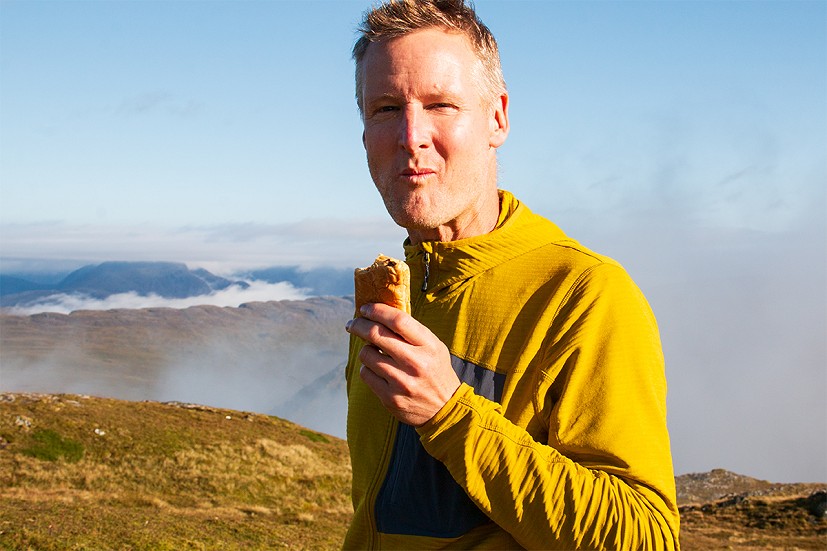
But in addition to my personal dislike of the stuff, I don't think it's a great idea from a nutritional standpoint either: while it will give you something in the way of calories, it's all carbs and sugar, which leaves (me at least) feeling hungry about half an hour later, not even a quarter of the way up the first Munro. If you happen to be a fan of the quick squished brioche/pain au chocolate option, try pairing it with a fistful of mixed nuts for fat and protein, and a pear rather than a banana to give you slightly more fibre to keep you fuller for longer.
- Faffless factor: 9/10 (Banana might get squished)
- Portability: 10/10 (very light, because it's mostly air)
- Nutrition score: 10/20 (lacking in protein and fibre)
- Deliciousness: 7/10 (but easy to eat straight out of bed at 5am)
Conclusions?
In descending order, scores out of 50, our champions of breakfast are:
So in my highly objective and useful analysis, the best hill breakfast is, quite boringly, either a yogurt pouch with muesli and nuts, or overnight oats. (The really clever among you will notice that these are roughly the same thing, just left to fester for differing lengths of time.) Generalised leftovers come in a close second at 40 out of 50 points, and porridge takes third place, closely followed by the squished banana/brioche combo. Heading up the middle of the pack is the tinned beans and sausage, then my beloved Scottish breakfast pack, and trailing at the rear is a sharing bag of Tangfastics. Who'd have thunk it?
The thing to remember is that while breakfast isn't always the most important meal on a day-to-day basis, setting yourself up to be sustained on the hill is pretty crucial to your own, (and by proxy, other people's) happiness. Make sure your breakfast - whatever option you decide do go for - has a good balance of carbs, protein, fat and fibre. That said, if you do want to cook scrambled eggs and smoked salmon on sourdough, washed down with a bellini for a summit sunrise, who am I to stop you?
When she's not researching hill food for UKH, Fliss doubles as a proper cookery writer. If you're a young(ish) person who wants to expand their kitchen repertoire beyond pesto-pasta and beans on toast, then check out her book, Do Yourself a Flavour
